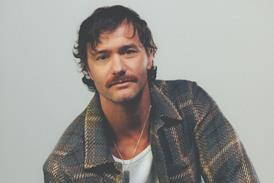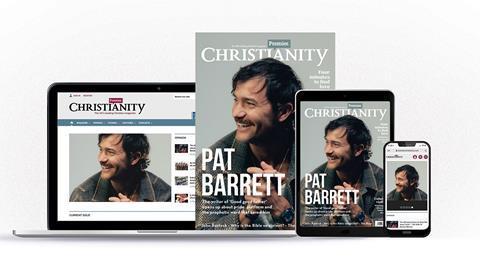When one of his youth group declared he was “the main character,” it struck a chord with Rev Jamie Sewell. Too often, Christians see themselves as the saviour - rather than pointing to the one who can really save. Let’s stop living as if it all depends on us and embrace the freedom Christ brings

We were halfway down the motorway in a rattling old minibus full of teenagers when one of the boys declared, loud enough for the whole bus to hear, “Lads, I’m the main character!”
What followed was anarchy.
Howls of laughter. Someone threw a shoe. Another shouted, “You’re not even top five, bro!”
I was driving, slightly baffled, doing my best to keep the minibus on the road while 17 teenagers basically lost their minds. I had no idea what he meant.
Having looked it up. I discovered ‘main character syndrome’. Pop psychology’s term for the idea that we live our lives as if we’re the protagonist everything revolves around. Not only do we view the world from our own perspective, we assume everyone else is viewing us too.
I couldn’t stop thinking about it. Walking down the street, I caught myself casting everyone else, the postman, the woman walking her dog, the guy beeping because I hadn’t pulled away the moment the traffic lights changed, as background characters in my story. But they weren’t. They were the main characters in their own.
Online, it hit even harder.
Scrolling Facebook, Instagram, X. I saw personal timelines that looked more like personal shrines. Virtual temples of idolatry to self. And I realised, mine looked just the same. Another shrine in the endless feed of people, hoping to be seen, known and liked as the main character.
But this idea isn’t just something teenagers joke about or influencers lean into. About ten years ago, it nearly broke me.
The cost of playing saviour
In 2011, my wife and I moved to Ladbroke Grove in west London to set up an Eden team, a missional community committed to living incarnationally in a deprived neighbourhood.
On the first day, I turned to Becci and said: “I’m going to go and introduce myself to the neighbours.” We were living in a block of flats, so there were people to the side of us, above us and below us. I was ready.
I knocked on the first door. No answer. Second door. Still nothing. By the third door, I was starting to feel like someone had forgotten to inform the supporting cast that the lead actor had arrived.
Then I heard the door opening. This was it. My big moment. The first captive to be set free. A young woman in her 30s looked at me with polite disinterest. I said confidently: “Hi! My name’s Jamie. I’ve just moved in upstairs.”
She looked me up and down, replied: “Good for you”, before shutting the door in my face. It was humbling. A quiet warning that I wasn’t the hero I thought I was.
When we position ourselves as the ones with all the answers, we end up feeling like we have to carry all the responsibility
But we stayed and we served. We built deep relationships, especially with a group of teenage boys. We didn’t swoop in and save the day as I’d imagined. We simply did life with them, week in, week out. Still, deep down, I saw myself as the main character striving to be the saviour. Then 2014 came.
Within six months, several of the boys we knew well were involved in serious stabbings. Others were sent to prison. And then came the unthinkable: one died of a drug overdose.
It was heartbreaking.
Because I saw myself as the hero, the one sent to rescue and redeem, in my mind there was only one logical person to blame when things fell apart: me. If I was going to take the credit for the success stories, I had to take the blame for the tragedies. And that’s the danger of casting yourself as the main character, you might just start thinking you’re the saviour that the world relies on.
Through tragedy, and years of counselling, I was reminded in the harshest way that I’m certainly not the saviour. And the truth is, I was never meant to be.
Servants, not sects
It turns out, even the earliest disciples weren’t immune to main character syndrome. In Luke 22, we’re told “a dispute also arose among them as to which of them was considered to be greatest.”
Picture the scene: Jesus had just broken bread with them, told them he’s about to suffer and die, and they’re arguing about who’s the best apostle. It’s as if they’ve seen the main character standing right in front of them…and all they’re interested in is vying for who’s going to be his wing man.
If I was going to take the credit for the success stories, I had to take the blame for the tragedies.
Yet Jesus doesn’t rebuke them with rage. He just gently, clearly, redefines greatness: “The kings of the Gentiles lord it over them… but you are not to be like that. Instead, the greatest among you should be like the youngest, and the one who rules like the one who serves” Luke 22:25–26.
That’s the kingdom. Not a ladder, but a table.
And it’s not just the disciples. Take Saul on the road to Damascus. He was the centre of his own story, convinced he was the righteous one leading the charge - until Jesus showed up.
The main character mindset also creeps into how we do church.
I’ve worked in both evangelical and Anglo-Catholic traditions. And when you’ve got a foot in both camps, you start to hear the criticisms each one throws at the other. The Catholic end often points out, quite fairly, how easily evangelicalism can become personality-driven, where everything revolves around the charismatic preacher on the stage. Meanwhile, evangelicals may roll their eyes at Catholic rigidity, clinging to form and tradition, as if nothing new can be trusted.
But the danger is the same: when church revolves around us, our preferences, styles and systems, we lose sight of the main character. I’ve witnessed the subtle ways we start identifying ourselves not primarily as followers of Christ, but as part of a sect or a stream:
“I’m conservative evangelical.”
“I’m liberal Anglo-Catholic.”
“I’m progressive.”
“I’m reformed.”
“I’m charismatic.”
“I’m post-evangelical.”
“I’m Orthodox-adjacent with Celtic leanings and a robust online presence.”
There is a problem when those labels become our identity. When we build platforms, arguments and personalities around them. When we fall into the trap of offering our ‘main character’ created persona rather than offering the actual main character.
Christ at the centre
When we position ourselves as the ones with all the answers, we end up feeling like we have to carry all the responsibility. And ultimately that will break us - or those around us. It divides and distracts us.
Being a vicar, people often expect me to have the answers to things far beyond my training. That expectation can be temptingly affirming, but also dangerous. If I position myself as the main character, rather than pointing towards Jesus, I enter the kind of territory that sadly leads to abuse of power and disillusionment.
Because I saw myself as the one sent to rescue and redeem, in my mind there was only one logical person to blame when things fell apart
My hope in writing this is that you might feel a sense of liberation. Liberation from crafting the perfect post, building a social media shrine to yourself, measuring your worth by whether or not you got the promotion, or whether your church is growing.
This isn’t an excuse for passivity — it’s an invitation to try, with courage, faith, and humility, while knowing that success or failure isn’t the place where your identity is built. Because it’s not where your hope is found. It’s not where your salvation is found and it’s not where anyone else’s salvation is found either.
You are not the main character…and that’s good news! The main character has a name. His name is Jesus. He loves you entirely, unimaginably and he’s inviting you to be part of his story.





































No comments yet